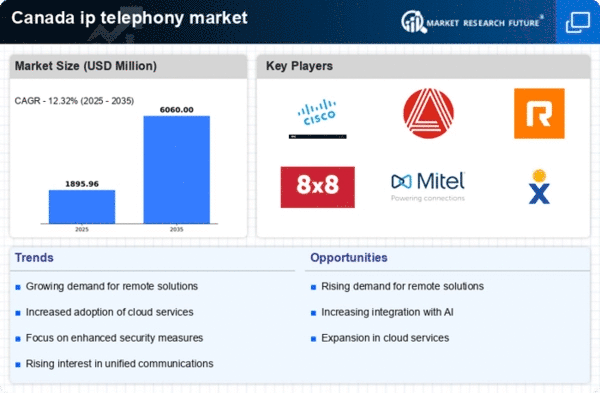Advancements in Network Infrastructure
The ongoing improvements in network infrastructure across Canada are playing a pivotal role in the growth of the ip telephony market. With the expansion of high-speed internet access and the rollout of 5G technology, businesses are increasingly able to adopt advanced communication solutions. Enhanced bandwidth and reduced latency contribute to better call quality and reliability, which are essential for effective communication. As of November 2025, approximately 80% of urban areas in Canada have access to high-speed internet, facilitating the adoption of ip telephony systems. This trend indicates that the ip telephony market is poised for further growth as more businesses leverage improved network capabilities to enhance their communication strategies.
Cost Efficiency and Operational Savings
Cost efficiency remains a critical driver in the ip telephony market. Canadian businesses are increasingly turning to ip telephony solutions to reduce communication costs associated with traditional phone systems. By leveraging internet-based communication, companies can save significantly on long-distance calls and maintenance expenses. Reports indicate that organizations can reduce their telecommunication costs by up to 50% by switching to ip telephony systems. This financial incentive is particularly appealing to small and medium-sized enterprises (SMEs) in Canada, which often operate with limited budgets. As a result, the ip telephony market is witnessing a growing adoption of cost-effective solutions that enhance operational efficiency while minimizing expenses.
Regulatory Compliance and Data Security
In the context of the ip telephony market, regulatory compliance and data security are becoming increasingly critical. Canadian businesses are required to adhere to various regulations regarding data protection and privacy, which influences their choice of communication solutions. The ip telephony market is responding to this need by offering solutions that ensure compliance with regulations such as the Personal Information Protection and Electronic Documents Act (PIPEDA). Companies are prioritizing secure communication channels to protect sensitive information, which is driving the demand for ip telephony systems that incorporate robust security features. As organizations become more aware of the risks associated with data breaches, the focus on compliance and security is likely to shape the future landscape of the ip telephony market.
Growing Demand for Remote Work Solutions
The increasing trend towards remote work in Canada has led to a heightened demand for effective communication tools, particularly in the ip telephony market. Businesses are seeking solutions that facilitate seamless communication among remote teams. According to recent data, approximately 30% of Canadian employees are working remotely, which has prompted organizations to invest in ip telephony systems that support voice, video, and messaging functionalities. This shift is likely to continue, as companies recognize the importance of maintaining productivity and collaboration in a remote environment. The ip telephony market is thus experiencing a surge in demand for solutions that cater to the needs of a distributed workforce, driving innovation and competition among service providers.
Integration with Unified Communication Platforms
The integration of ip telephony with unified communication (UC) platforms is emerging as a significant driver in the ip telephony market. Canadian organizations are increasingly seeking solutions that combine voice, video, and messaging into a single platform, enhancing collaboration and productivity. This trend is supported by the fact that over 60% of Canadian businesses are adopting UC solutions to streamline their communication processes. The ability to integrate ip telephony with other business applications, such as customer relationship management (CRM) systems, further enhances its appeal. As a result, the ip telephony market is witnessing a shift towards comprehensive communication solutions that cater to the evolving needs of businesses.
















